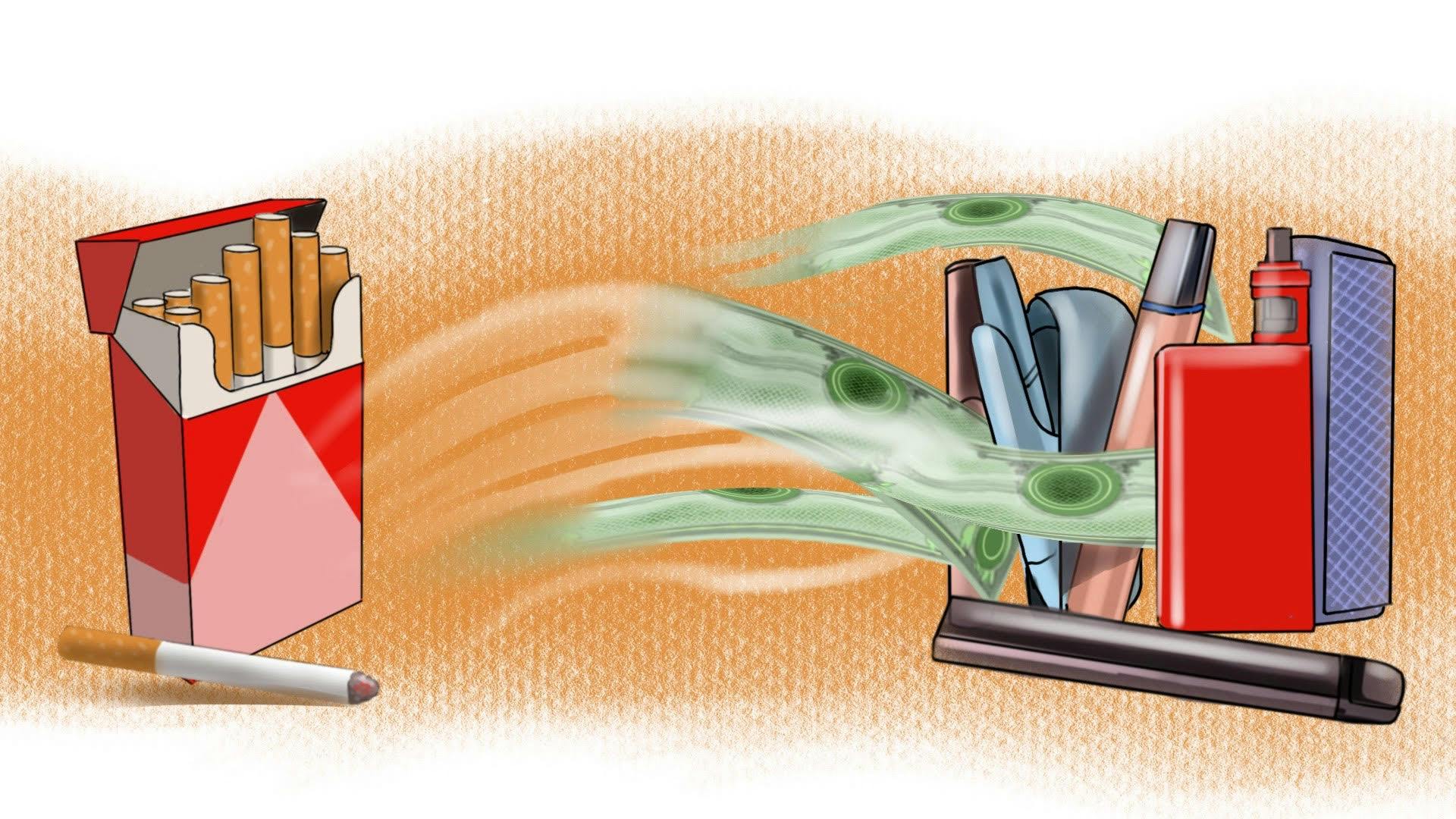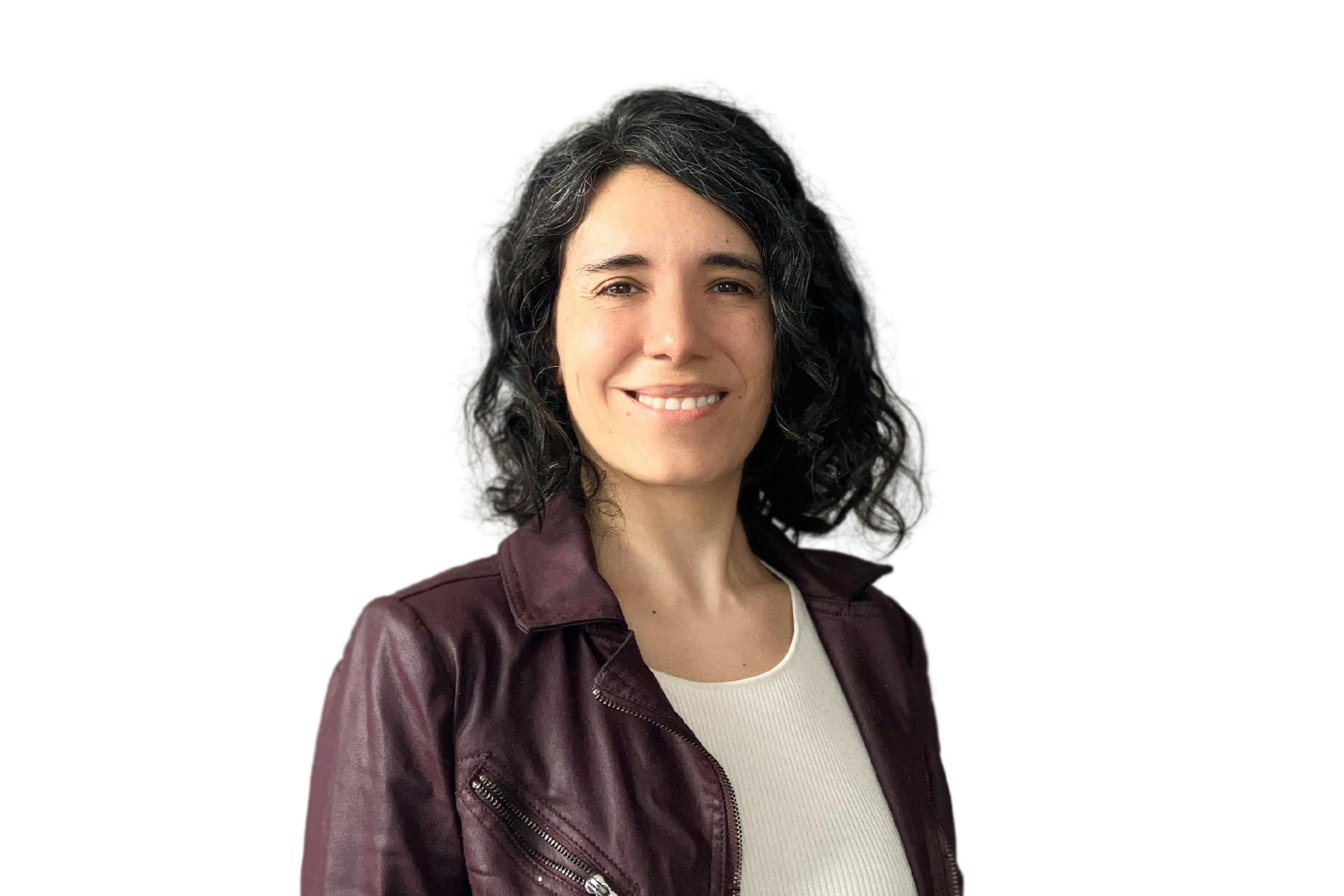Nicotine Networks is a collaborative reporting project by The Examination and five news outlets based in Latin America: El Clip, Agência Pública, Salud con lupa, ChequeaBolivia and Colombiacheck.

Tobacco money is flowing to pro-vaping groups and influencers in Latin America as the industry – facing declining cigarette use and an uncertain financial future – pushes for acceptance of its latest generation of smokeless nicotine products.
The flow of money is anything but direct. Funds often pass through multiple intermediaries, with the U.S.-based nonprofit Foundation for a Smoke-Free World, Inc. acting as a hub.
Funding recipients, from Costa Rica to Brazil, have promoted vaping and heated tobacco devices in congressional hearings, in stories on vaping “news” websites and on social media posts, selectively citing studies that paint the products in the most favorable light — all without clearly disclosing financial ties to the tobacco industry, an investigation by The Examination in collaboration with media partners in Colombia, Perú, Brazil and Bolivia found.
“They would never voluntarily disclose this because they know the moment they say they are indirectly funded by the tobacco industry, their credibility gets shot,” said Stella Aguinaga Bialous, a professor at the University of California San Francisco who researches the tobacco industry’s strategies and was talking generally about such funding.
Credibility has been a longstanding challenge for the tobacco industry.
The tobacco giants lied for decades about the health risks of smoking and, in the ’90s, legal settlements in the U.S. provided extensive proof of their dishonesty. In the aftermath, more than 180 countries joined a treaty vowing to protect public policy from the industry’s interference.
Branding itself as part of the solution to the epidemic that it helped fuel, Philip Morris International Inc. has poured more than $400 million into the Foundation for a Smoke-Free World over the last seven years.
The foundation, in turn, pays other nonprofits and private companies, many of which conduct research or promote vaping and other nicotine products — products in which Philip Morris International has a substantial vested interest. Those nonprofits and companies, in turn, sometimes fund others who do the same.
As of December 2022, Philip Morris International was the Foundation for a Smoke-Free World’s sole funder.
Francisco Javier Ordóñez is the president of the Colombian Association of Vapers, known as Asovape Colombia. In a congressional hearing in Bogotá last year, Ordóñez spoke against subjecting vapes to the same restrictions as cigarettes and against proposed legislation that would impose new taxes on vaping products in Colombia.
Ordóñez has received funding from Knowledge-Action-Change Ltd., a private company backed by the foundation that has awarded “scholarships” of up to tens of thousands of dollars to support projects related to smokeless nicotine products, The Examination found.
Ordóñez did not disclose at the hearing that he had received industry-linked payments. He said he was speaking on behalf of 400,000 Colombian vapers, and that his motivation was only to help people quit smoking.
“What we are most interested in, as an association, is precisely helping to make tobacco addiction disappear in Colombia, by any means,” Ordóñez told lawmakers.
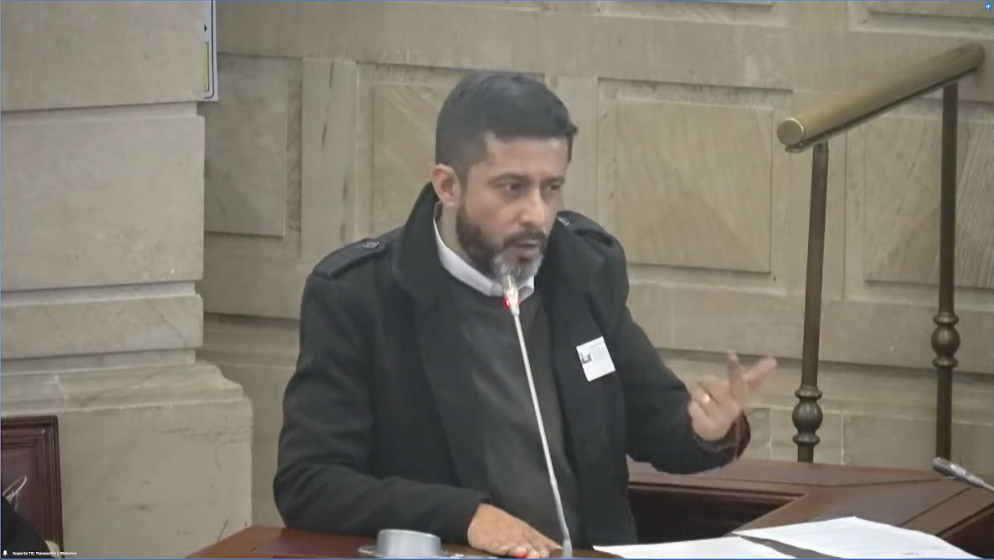
Worldwide smoking rates decreased 8 percentage points between 1990 and 2019, according to estimates from a 2021 Global Burden of Disease study on tobacco smoking prevalence.
Helping smokers quit is also how the tobacco industry promotes e-cigarettes, which contain addictive nicotine, pose potential long-term health risks and are widely used by former smokers and non-smokers as well as smokers.
Philip Morris International, one of the biggest industry players, has invested more than $10 billion into smoke-free products like heated tobacco and vapes in the past 16 years. Such products accounted for nearly a third of the company’s net revenue in 2022 alone, financial filings show.
Governments across Latin America, and the world, are wrestling with how to regulate these new nicotine products, with some instituting outright bans, others imposing high taxes or other restrictions and still others taking little or no action at all.
In Latin America, government vulnerability to tobacco industry interference is among the highest in the world, according to an analysis by The Examination of results from the 2023 Global Tobacco Industry Interference Index.
Extensive research shows that one of the ways the tobacco industry interferes with regulations is by funding other groups, said Bialous, the professor from the University of California San Francisco.
“We have decades of documented influence,” she said.
Ordóñez and Philip Morris International declined to comment on this story. Knowledge-Action-Change declined requests for an interview or to answer written questions, but a spokesperson emailed a statement defending the scholarship program and saying the company is “proud to amplify the consumer voice that is too often unheard in this debate.”
The foundation told The Examination that it operates independently of Philip Morris International and that its goal is to reduce death and disease caused by smoking. The foundation doesn’t exert any direct or indirect influence on its grantees, Nicole Bradley, its vice president of communications, said in a written statement.
“The Foundation makes its own decisions about operations and grants and sets its own research agenda,” Bradley wrote.
Policymakers and researchers have disputed the foundation’s independence. When the foundation was created, officials in charge of helping implement the World Health Organization international treaty on tobacco control said that countries that collaborate with the foundation would be violating the treaty's provisions.
A former employee filed a lawsuit in 2021 accusing foundation executives of using the nonprofit to further the interests of Philip Morris International, calling the foundation’s assertions of independence a “mere smoke screen.” The suit was later settled.
In June 2023, BMJ Open, an online journal, retracted a paper funded by a company that received more than $12 million from the Foundation for a Smoke-Free World, saying that it violated its policy on publishing tobacco industry funded research.
In October, the foundation announced that its funding agreement with Philip Morris International had ended and that it had received its last contributions from the company — totaling $140 million, equivalent to eight years’ funding at the 2022 rate.
The foundation’s new president said the organization won’t accept any further tobacco industry funding. The foundation recently changed its name to Global Action to End Smoking, Inc., according to records in the Delaware and New York registries of corporations.
Pro-vaping groups share funding source
When Ordóñez hailed the virtues of vaping to Colombian lawmakers, it wasn’t the first time. He had done so before as president of Asovape Colombia and of ARDT Iberoamérica (the Ibero-American Association for Tobacco Harm Reduction), a nonprofit umbrella that includes about a dozen pro-vaping groups across Latin America — many of them operating under the name Asovape.
In hearings, letters and media interviews Ordóñez has presented himself and leaders of other pro-vaping groups as consumer representatives. He did not disclose their financial ties to vaping businesses and to organizations funded by the tobacco industry.
At least three former directors of Asovape Perú owned vape businesses when the association was created in 2020, the Peruvian news organization Salud con lupa reported this week. Salud con lupa is a reporting partner of The Examination.
Ordóñez was paid through a scholarship by Knowledge-Action-Change for his work on websites promoting smokeless nicotine products. The London-based company has received more than $6.4 million from the Foundation for a Smoke-Free World over the last six years. The funds have paid for the scholarship program, which helped pay for projects like a website in Uganda that promoted smoke-free nicotine products and a U.S. news site that publishes vaping-friendly stories.
Knowledge-Action-Change has also received money from Nicoventures, a subsidiary of British American Tobacco.
It’s not clear how much Ordóñez, or a web designing company that he owns, received from Knowledge-Action-Change, as those records aren’t public.
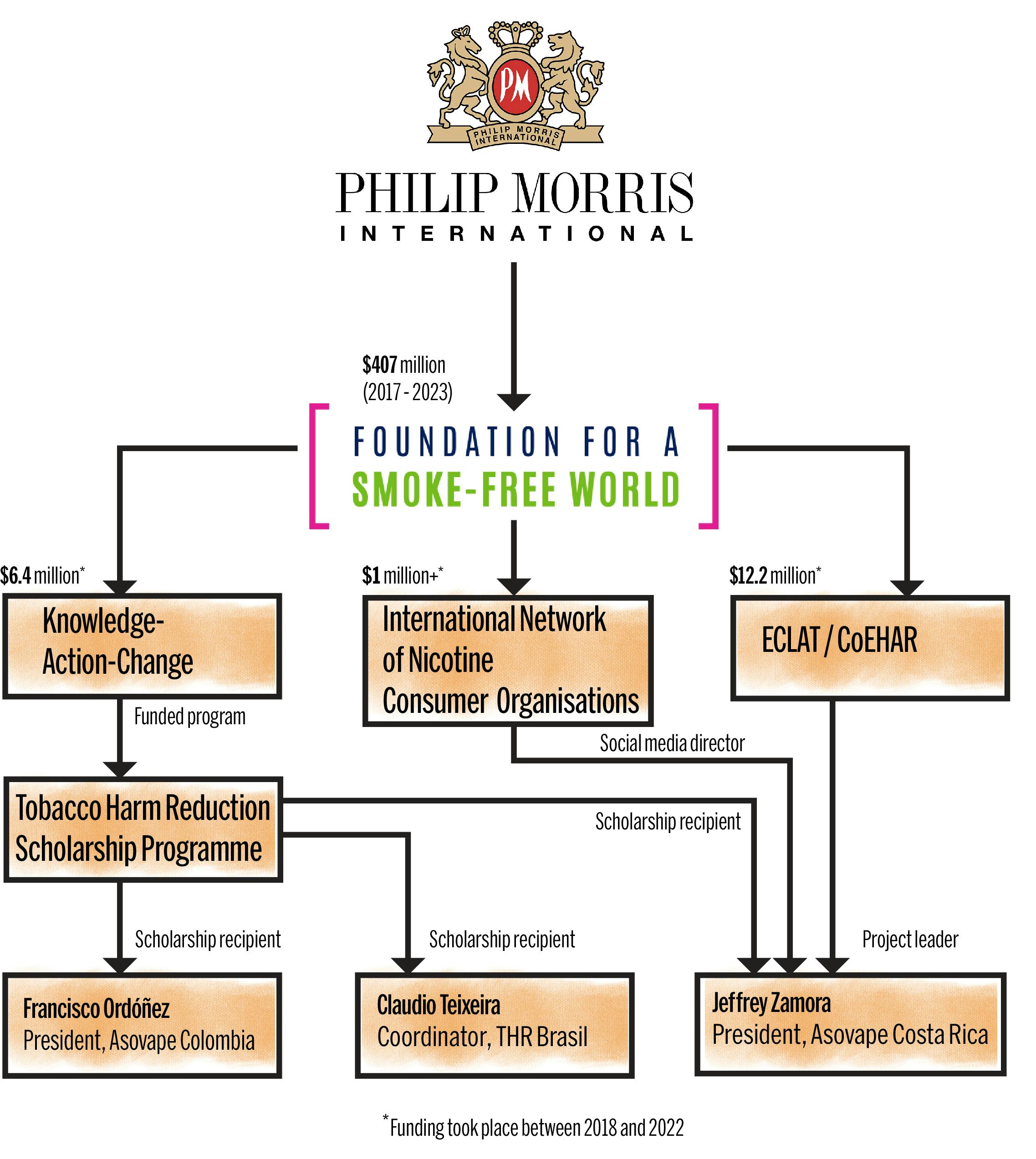
In a YouTube video, Ordóñez said he received a Knowledge-Action-Change scholarship to build an online academy about tobacco harm reduction. The academy was for all those interested in learning about tobacco harm reduction and “low-risk” nicotine products, he said.
“Harm reduction” is how the tobacco industry, the Foundation for a Smoke-Free World and other groups characterize the benefits of nicotine products such as vapes or heated tobacco.
The scholarship also paid for Ordóñez to compile scientific studies translated into Spanish for the ARDT Iberoamérica website, Ordóñez added.
ARDT Iberoamérica’s website says the group is made up of “citizen spokespersons.” It also states that both the online academy and the ARDT Iberoamérica website were paid for by Knowledge-Action-Change with funds originally coming from the Foundation for a Smoke-Free World.
The site says that ARDT Iberoamérica doesn’t receive funds from the tobacco or vaping industry. It fails to note that the Foundation for a Smoke-Free World itself has been fully backed by Philip Morris International.
The site also doesn't disclose that Ordóñez and his wife own the company, Kramber Designs S.A.S, that designed and developed the site. The Examination found this information in the company's incorporation records filed with the Bogotá Chamber of Commerce.
Ordóñez’s company has co-run two other websites about new nicotine products that have received money from Knowledge-Action-Change and another organization funded by the Foundation for a Smoke-Free World.
Postings on Asovape Colombia’s Facebook page and online clips of Ordóñez speaking to various people show Asovape Colombia has supported bills allowing limited TV and billboard advertising of new nicotine products and use of vapes and heated tobacco in many indoor spaces where smoking is banned. Philip Morris International’s heated tobacco device is the market leader.
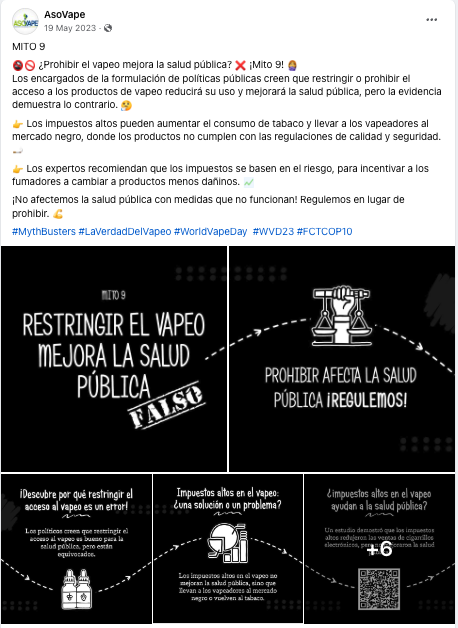
Asovape Colombia has spread advertising promoted by the World Vapers Alliance, a group that was spun off by an organization that received funding from British American Tobacco, Japan Tobacco International and Altria.
All the while, Asovape Colombia shares few details about its operations. Its website does not say who funds it, how many members it has or how many of those have ties to the vaping industry. It identifies only one board member on its site: Ordóñez. The nonprofit also hasn't provided required financial information to the City of Bogotá.
Ordóñez says Asovape’s efforts on behalf of vapers are paying off.
In a 2021 Facebook video, Ordóñez said he had worked with Mauricio Andrés Toro Orjuela, a Colombia lawmaker, to draft a bill that would regulate e-cigarettes and other nicotine products with fewer restrictions.
“They have allowed us to work hand in hand with them to create, let's say in some way, provide flesh, substance to this bill,” Ordóñez said in the video.
Toro, after initially agreeing to an interview, failed to make himself available or to respond to written questions. He left Congress in 2022. The bill died because Congress did not pass it within the required timeline.
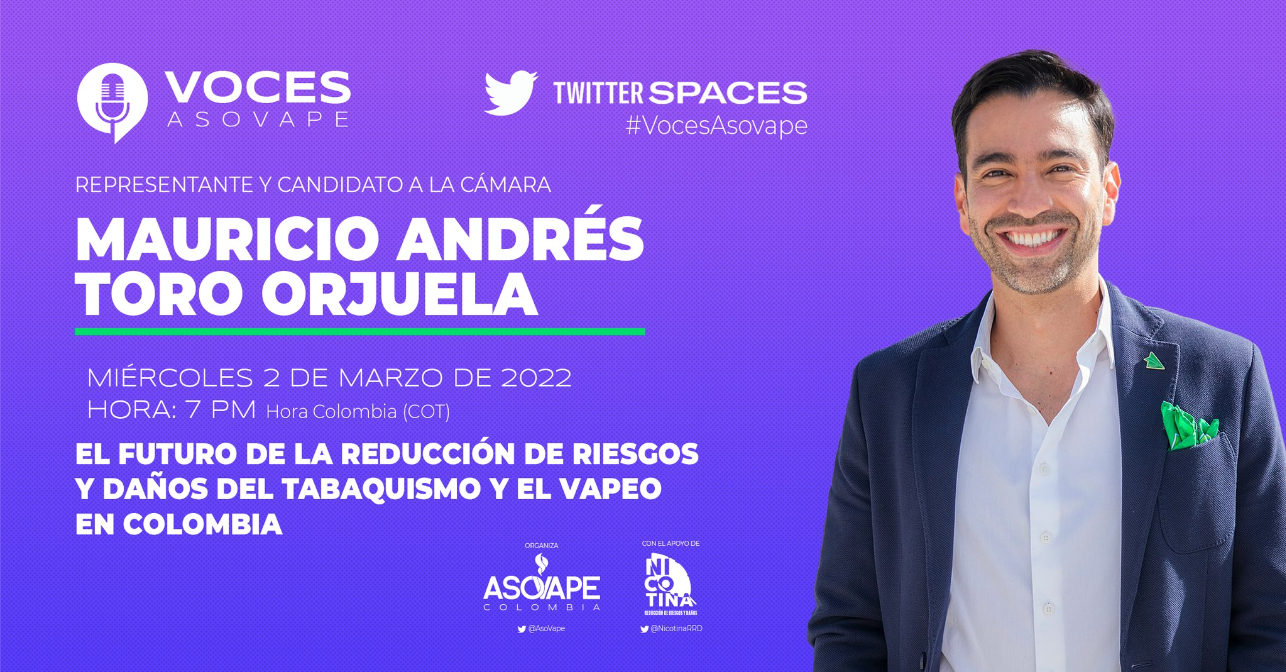
At a June 2023 conference on new nicotine products in Warsaw, Poland, Ordóñez said he believed his group had been able to stop about five legislative proposals to regulate nicotine products in Colombia.
“There’s going to be battles that we are going to win; there’s going to be battles that we are going to lose, very likely, but, obviously, the war continues,” Ordóñez said during the panel.
To date, Colombian lawmakers haven’t passed any regulations on vapes.
Colombian Rep. Carolina Giraldo Botero told The Examination she wasn’t aware of the existence of the Foundation for a Smoke-Free World or of Ordóñez’s connections to the foundation. She says a bill that she authored to increase taxes on vape products — a measure opposed by Ordóñez — as well as on cigarettes and other tobacco products — was torpedoed by lobbyists.
"It's a conflict of interest and he should say it upfront,” Rep. Giraldo said. “Even if there's an intermediary, if the origin is Philip Morris, you have to declare it."
Colombian Senator Norma Hurtado Sánchez, who has co-authored several bills to regulate new nicotine products, said she, too, was unaware of the links between the foundation and Ordóñez.
She said her bills have faced intense opposition by various groups, including Asovape.
“I think they have lobbied very strongly in the past three years in Congress to get to be listened to by different Congress members in different political parties,” she said about Asovape.
And lobbying appears to be influencing her colleagues, Hurtado said. Now, it's much more common to hear Congress members talk about vaping as a tool for “harm reduction,” she said. Whereas before, “It wasn’t the norm,” she said.
Ordóñez didn’t try to influence legislation only in Colombia. In 2021, as president of ARDT Iberoamérica, he sent a letter to Laurentino Cortizo Cohen, the president of Panamá, one of the countries with the lowest smoking rates in the world. In the letter, Ordóñez opposed a bill that banned sales of vape and heated tobacco products. He said banning the products could create a black market that could put users at risk. Cortizo waited a year before signing the bill.
In Perú, Ordóñez advised a group that was trying to create an association of business owners to form a nicotine users group instead, Salud con lupa reported.
After initially agreeing to an interview with The Examination, Ordóñez failed to answer phone calls, texts and emails with questions.
‘Transforming the problem’
Nicolás Megudan said Asovape Colombia doesn’t represent him and that for him, vaping has not been a helpful solution.
“We are not solving a problem,” said the 30-year-old from Santiago de Cali. “We are transforming the problem.”
He was already well on his way to stopping smoking when he took up vaping about three years ago, he said. He had limited himself to no more than five cigarettes each week — and only on the weekends. Then, he got used to vaping. It wasn’t as satisfying as smoking but, unlike cigarettes, it didn't leave his hands stinking or his mouth feeling as dirty. It didn’t bother anyone around him. He could vape in his bedroom, in the car, as he walked to the office: It was easy.
“I can be at a doctor's appointment, go to the bathroom, take out my vape, take two puffs, and nothing happens ,” he says.
But vaping seemed to irritate his lungs, Megudan said. He coughed, and started to feel short of breath when going up the stairs. He now only vapes on occasion.
He said vape packaging should have health warnings and that he worries about the large number of kids he sees vaping. He wants the exact thing that Asovape opposes: for vape products to have the same regulations as cigarettes, such as bans on advertising.
E-cigarettes threaten to hook a new generation on nicotine or may prompt young people to start smoking, and in many countries, vaping rates are higher among youth. A 2022 survey by the Colombian government found that 11% of students ages 12 through 18 reported having used an e-cigarette in the past month.
Accurate information is critical for lawmakers as governments across the world try to figure out how to best regulate e-cigarettes and other emerging nicotine products to protect public health.
Studies show that e-cigarettes expose users to fewer of the hazardous chemicals present in tobacco smoke, and, generally at lower levels, but scientists still haven't identified all the chemicals present in vape aerosols. While many researchers believe vaping will likely be safer than smoking, others think it’s too soon to say. There’s even less research about heated tobacco products.
Manuel Conrado Pacheco, a physician and member of the Colombian Association of Pulmonology and Thoracic Surgery, says transparency regarding the funding behind those who promote nicotine products is critical for legislators.
“A bad decision in public health can end up generating chaos and more disease in the future,” Pacheco said.
Undisclosed industry ties in Costa Rica
The head of the Costa Rican Asovape group and new president of ARDT Iberoamérica, Jeffrey Zamora, ran a company that sold e-liquids used in e-cigarettes, and has been producing a pro-vaping documentary series funded by Knowledge-Action-Change.
Zamora was still promoting his e-liquids when, in June of 2020, Asovape Costa Rica addressed a letter to lawmakers opposing a bill taxing vape products and banning their use in many public spaces. The group said it was exclusively looking after the interests of consumers.
A year later, Asovape Costa Rica wrote a letter about the same bill that minimized the health risks of vaping, comparing them to those of riding a bicycle, crossing the street or falling in the bathroom.
Around that time, Zamora became social media director of the International Network of Nicotine Consumer Organisations, or INNCO, a group that has received more than $1 million from the Foundation for a Smoke-Free World. (The foundation cut the organization's funding in March.) He now works for a research organization that has received millions of dollars from the foundation, records show.
At a legislative hearing in August of 2022, Zamora sat next to a representative of the Costa Rica Chamber of Commerce and urged lawmakers to vote against a bill that would require plain packaging for vapes, heated tobacco and cigarettes.
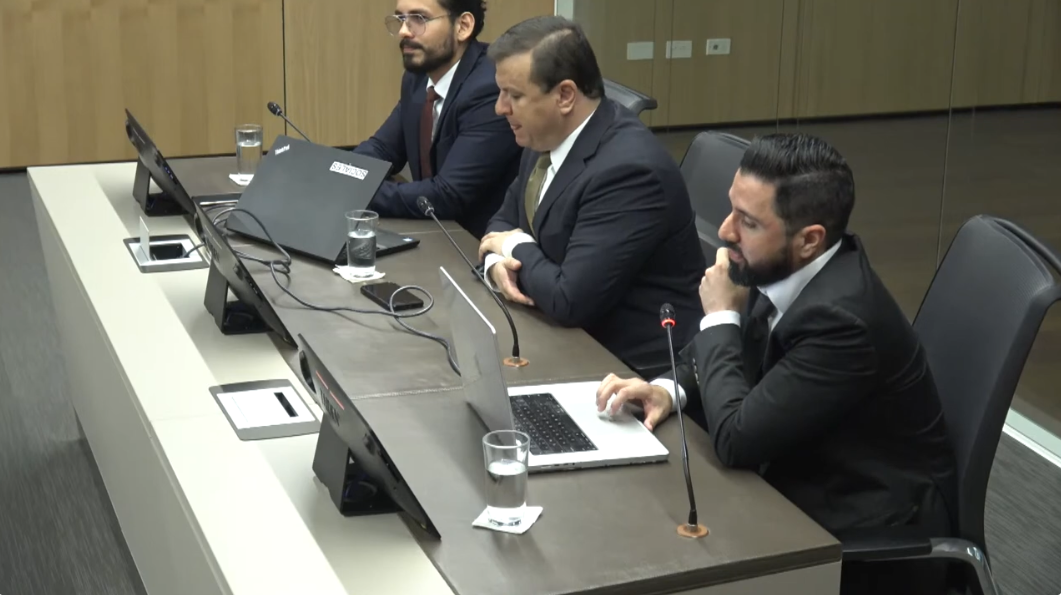
The committee voted 5-3 to keep the bill alive. It hasn’t yet been scheduled to go before the full Legislative Assembly.
The tobacco industry, including Philip Morris International, has vigorously fought plain packaging across the world. Such measures are aimed at making the products less appealing.
Zamora did not respond to emails or messages sent through his group’s Facebook account and his work website. A communications consultant who used to work with Asovape said Zamora declined to comment.
Kim Dabelstein Petersen, who acts as chief financial officer of the International Network of Nicotine Consumer Organisations, acknowledged that nearly all its budget had come from the foundation's grants, but said that neither the foundation nor Philip Morris International exerted any influence on the organization. He also said the network doesn’t tell its members — including the Asovape groups — what positions to take.
“None of us are trying to, in any way, benefit the tobacco companies. In fact, most of us hate them like the plague. All of us are former smokers,” Petersen said.
Costa Rican representative Priscilla Vindas Salazar said that she was unaware that Zamora was doing work for a group funded by the Foundation for a Smoke-Free World when Zamora addressed lawmakers in 2022.
Vindas, who supports the bill requiring plain packaging for cigarettes and new nicotine products, said she didn't even know that the foundation or the organizations Zamora received money from existed.
She said legislators don’t have the resources to research the funding of those who speak at hearings.
She would have wanted to know about Zamora’s income sources. Everyone has a bias, she said, and economic interests weigh on a person’s position.
“It's important that these links are shown,” she said.
Tobacco money indirectly funding vaping news and informational videos
A woman sits in a chair and speaks straight to the camera in a serious, heartfelt tone. “We can all see that the evidence is showing that vaping helps smokers to quit, that vaping is not creating an epidemic amongst youth, that vaping does not lead to smoking, that flavors are essential and that nicotine is not evil.”
Her name is Jessica Harding, and she is director of external engagement at Knowledge-Action-Change.
The video, posted in April on YouTube, is part of a #Safer documentary series partly funded by the company’s Tobacco Harm Reduction Scholarship Programme, and produced by Zamora.
Money from Knowledge-Action-Change and the International Network of Nicotine Consumer Organisations has also made its way into vaping-friendly publications in Latin America that have called themselves “independent press” and “journalism committed to the truth.”
Vaping Today, co-run by Ordóñez´s web design company, received money from the International Network of Nicotine Consumer Organisations. Its sister publication in Portuguese received funding from Knowledge-Action-Change. Vaping Today’s donation Paypal button links to a PayPal site for Kramber Designs, Ordóñez’s business.
Vaping Today promises its readers to counter the “systemic load of disinformation and misinformation in traditional media” about nicotine products, which it describes as “the true danger for public health.” An analysis of stories published on the site by The Examination found the content routinely amplifies research and points of view depicting e-cigarettes and other nicotine products in a positive light while downplaying more critical information.
Subscribe to our newsletter
Global health reporting, straight to your inbox
For example, the analysis found that about 10% of all posts from June 2020 to July 2023 mention that vaping is 95% less harmful than smoking — an estimate cited in an academic article in England that the vaping industry has frequently repeated to support its positions. The public health community has widely criticized the estimate. Three of the article’s authors, years after a critical editorial in the Lancet, said that the calculation could be “simplistic and misinterpreted.”
One story in Vaping Today last summer carried a large headline telling readers that studies had confirmed that heated tobacco products are less toxic than cigarettes.
Three of the study’s four researchers were affiliated with the Center of Excellence for the Acceleration of Harm Reduction, a research group funded by the Foundation for a Smoke-Free World. The fourth researcher co-founded a Mexican pro-vape group. These links weren’t disclosed.
Aside from Ordóñez, the other key figure behind Vaping Today is José Claudio Teixeira, coordinator of another pro-vape group called THR Brasil. An archived version of the group’s website, said it was backed by a Knowledge-Action-Change grant. The group now appears to be inactive.
Teixeira is Vaping Today’s editor-in-chief and his company has co-run both Vaping Today and its Brazilian sister site. He has also received three Knowledge-Action-Change scholarships. One of those scholarships, according to an archived page of Knowledge-Action-Change’s website, supported Teixeira as he prepared a “base text” for regulation of e-cigarettes in Brazil. It does not say how much money he might have received.

Brazil’s health regulatory agency was at the time requesting feedback about its ban on e-cigarette and heated tobacco sales.
Members of THR Brasil, which became active in 2019, showed up in at least one of the public hearings that year and sent a letter to the health agency asking for smokers to be allowed to have access to e-cigarettes and other nicotine products, according to a report by the agency.
Brazil’s health agency realized the group’s connections to a group funded by the Foundation for a Smoke-Free World and in a 2022 summary report noted: “Such affiliation, even though there is no proof of receiving resources directly, already demonstrates a possible conflict of interest.”
On its website, THR Brasil posted a draft bill that would allow sales and the promotion of e-cigarettes and heated tobacco products, with some restrictions. In Instagram and Facebook posts in 2020, the group said the proposal was being given to various political actors and encouraged readers to send it to a legislator of their choice.
Teixeira declined to comment on the record and didn’t respond to e-mailed questions.
What The Examination found about the Asovape groups in Latin America fits a familiar pattern, said Mary Assunta, head of global research and advocacy at the Global Center for Good Governance in Tobacco Control.
“It’s one or two individuals who set up an organization to represent consumers,” she said. “But they have a big voice, and they use their big voice to convince governments.”
Fernanda Aguirre at The Examination, Jose Luis Peñarredonda, from El Centro Latinoamericano de Investigación Periodística (CLIP), Jason Martínez, Alicia Tovar, Renzo Gómez, Alexandra Shimabukuro and Fabiola Torres from Salud con lupa, Alexander Campos, Sharon Mejía and Ana María Saavedra from Colombiacheck and Rafael Oliveira and Laura Scofield from Agência Pública contributed to this story.
The Global Center for Good Governance in Tobacco Control is funded by Bloomberg Philanthropies, which also supports The Examination.
Methodology
The Examination analyzed 933 stories published by Vaping Today from June 26, 2020, through July 26, 2023. The analysis centered on articles mentioning the expression “95%” in seven different variations. Each of these matches was manually verified to corroborate that 91 articles, or about 10% of the total, included the claim that e-cigarettes are 95% less harmful or safer than conventional cigarettes.
This story is a part of Nicotine Networks, an international reporting collaboration on tobacco industry tactics to promote a new generation of nicotine products across borders.
Watch Twitter Spaces discussions about Nicotine Networks with our reporting partners below, in English and Spanish.


